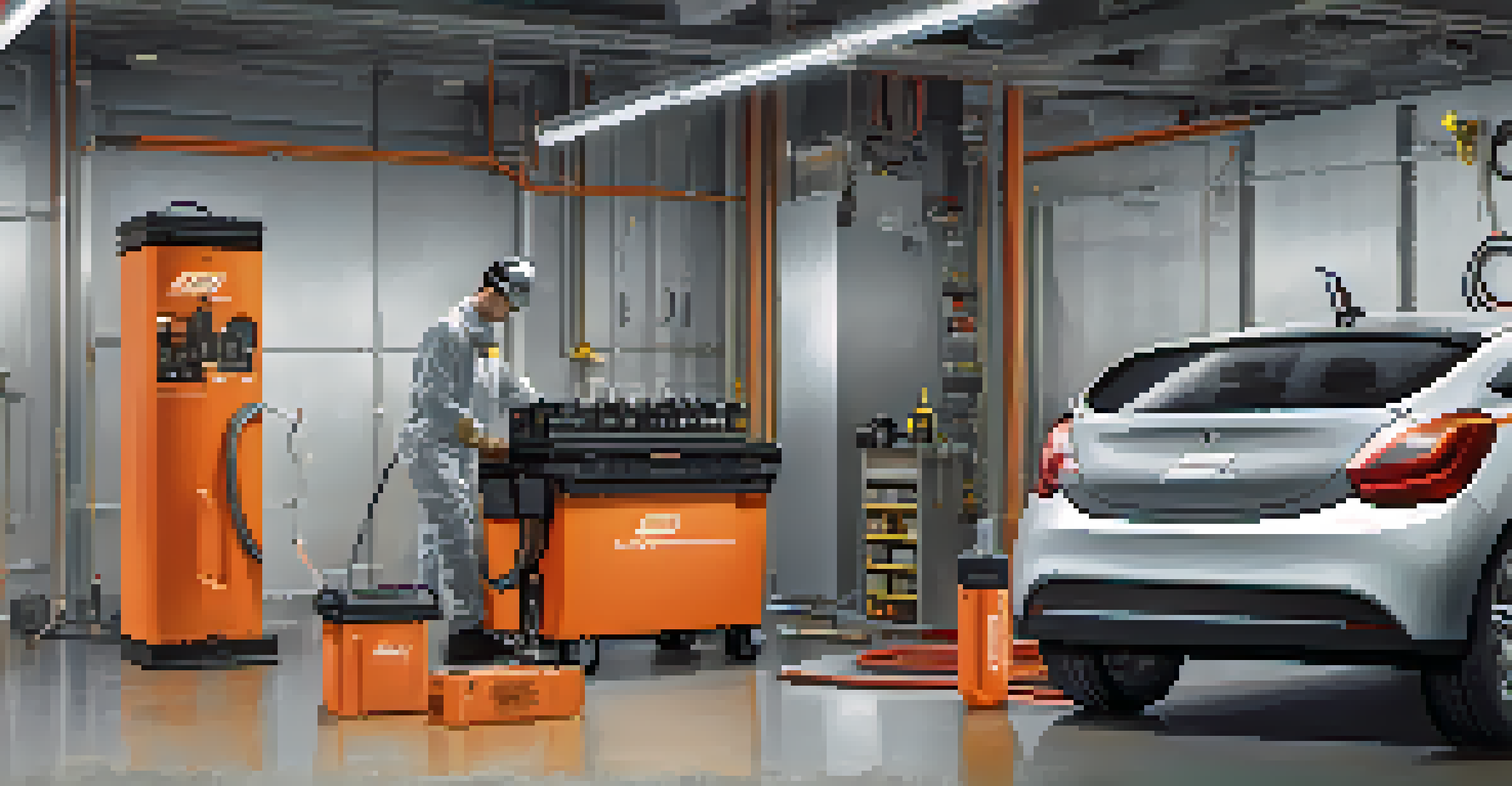Smart Energy Storage: Solutions for Home Automation

Understanding Smart Energy Storage Systems
Smart energy storage systems are designed to capture and store energy for later use. They play a crucial role in home automation by ensuring that energy is available when needed, even during peak consumption times. These systems help homeowners manage their energy use efficiently, reducing electricity bills and environmental impact.
The greatest energy efficiency is achieved by using smart technology to manage energy consumption.
At their core, smart energy storage solutions often utilize batteries, which can store excess energy generated from sources like solar panels. This stored energy can be used later, providing a seamless power supply during outages or high-demand periods. By integrating these systems with home automation, you can control when and how this energy is used.
As technology advances, smart energy storage systems are becoming more sophisticated, incorporating features like real-time monitoring and intelligent energy management. This means you can track your energy usage and adjust your settings through an app, making energy conservation easier and more intuitive.
Benefits of Integrating Energy Storage with Home Automation
Integrating energy storage with home automation offers numerous benefits, starting with enhanced energy independence. By storing energy generated from renewable sources, homeowners can reduce their reliance on the grid and increase self-sufficiency. This not only saves money but also provides peace of mind during power outages.

Another significant advantage is the ability to optimize energy consumption. With smart home systems, you can program appliances to run during off-peak hours when electricity is cheaper. This not only saves money but also helps balance the load on the grid, contributing to overall energy efficiency.
Smart Energy Storage Enhances Efficiency
Smart energy storage systems optimize energy use by storing excess power for later use, reducing costs and environmental impact.
Additionally, many smart energy storage systems can communicate with other smart devices in your home. This means you can automate energy use based on your lifestyle, ensuring that your home is always comfortable and energy-efficient without requiring constant manual adjustments.
Types of Smart Energy Storage Solutions Available
There are several types of smart energy storage solutions, each catering to different needs and preferences. The most common type is lithium-ion batteries, known for their efficiency and compact size. These batteries are often used in residential solar energy systems, allowing homeowners to store excess solar energy for nighttime use.
Renewable energy and smart storage solutions are the keys to a sustainable future.
Another option is flow batteries, which use liquid electrolytes to store energy. These batteries are ideal for larger homes or commercial applications, as they can be scaled easily. Although they may be less common in residential settings, they present a viable alternative for those needing more substantial storage capacity.
Lastly, some homeowners are exploring thermal energy storage solutions. These systems store energy in the form of heat, which can be used for heating or cooling a home. While they might require a bit more installation, they can provide significant savings on energy bills, especially in regions with extreme temperatures.
How to Choose the Right Energy Storage Solution
Choosing the right smart energy storage solution for your home involves considering several factors. First, assess your energy needs—how much energy do you consume daily, and what are your peak usage times? This information can help you determine the capacity of the storage system you require.
Next, consider the type of renewable energy source you have or plan to install. For example, if you have solar panels, a lithium-ion battery might be the best fit. Conversely, if you’re looking for a system that can handle larger loads, a flow battery could be more appropriate.
Integration Boosts Energy Independence
Combining energy storage with home automation allows homeowners to reduce grid reliance, ensuring energy availability during peak times.
Finally, evaluate your budget and installation options. Different systems come with varying price tags and installation requirements, so it's essential to find a solution that fits your financial situation while still meeting your energy needs.
The Role of Smart Meters in Energy Management
Smart meters are digital devices that provide real-time information about energy consumption, playing a pivotal role in energy management. By communicating directly with your energy storage system, they help optimize energy use and storage. This allows homeowners to make informed decisions about when to use or store energy.
With smart meters, you can track your energy consumption patterns over time and identify peak usage periods. This insight enables you to adjust your energy storage settings accordingly, ensuring you’re taking full advantage of your system. Additionally, many smart meters can alert you to unusual spikes in energy use, helping you catch potential issues early.
Integrating smart meters with home automation systems can enhance your overall energy efficiency. By combining data from your smart meter with automated home settings, you can create a more responsive environment that adapts to your energy needs, leading to greater savings and sustainability.
Potential Challenges of Smart Energy Storage
While smart energy storage systems offer numerous benefits, there are some challenges to consider. One of the primary concerns is the initial cost of installation. High-quality batteries and systems may require a significant upfront investment, which can be a barrier for some homeowners.
Additionally, the lifespan of batteries can vary significantly. While lithium-ion batteries typically last around 10-15 years, other types may have shorter lifespans. Understanding the longevity of your chosen system is crucial, as it affects long-term savings and replacement costs.
Choosing the Right System Matters
Selecting the appropriate energy storage solution depends on individual energy needs, renewable sources, and budget considerations.
Lastly, not all homes are suitable for every type of energy storage solution. Factors like available space, existing energy infrastructure, and local regulations can impact the effectiveness and feasibility of certain systems. It’s essential to conduct thorough research and consult with professionals to find the best fit for your specific situation.
Future Trends in Smart Energy Storage Technology
The future of smart energy storage technology looks promising, with continual advancements on the horizon. Innovations in battery technology, such as solid-state batteries, promise higher efficiency and longer lifespans. These developments could significantly reduce costs and improve the viability of energy storage for residential use.
Moreover, as the demand for renewable energy grows, we can expect to see more integrated solutions that combine energy storage with home automation. This means smarter systems that can not only store energy but also manage it more effectively, adapting to your lifestyle and energy habits.

Finally, regulatory changes and incentives for renewable energy adoption will likely drive further development in this field. As governments emphasize sustainability, new programs may emerge, making smart energy storage more accessible and appealing for homeowners looking to enhance their energy management strategies.